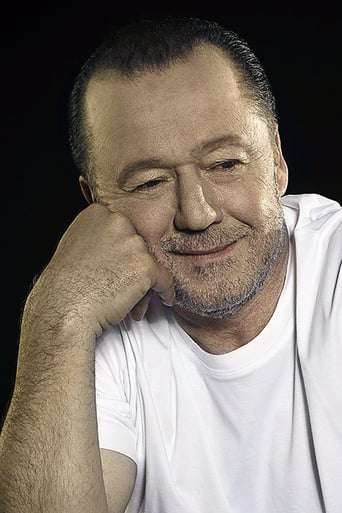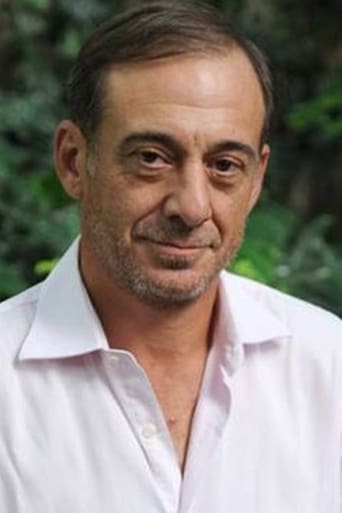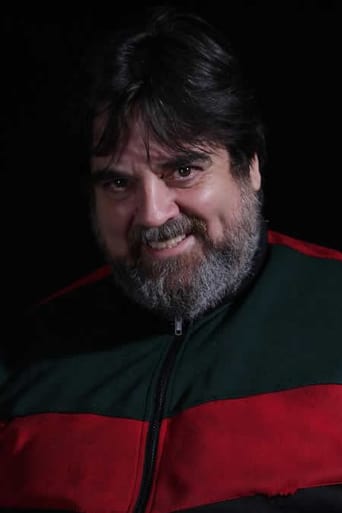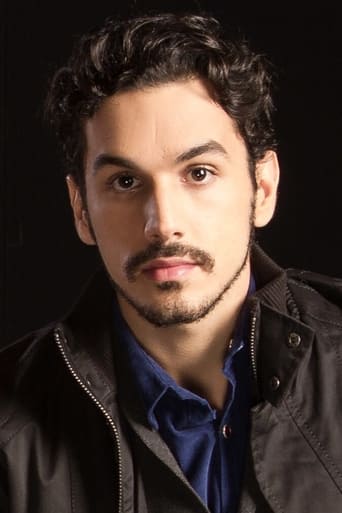Kattiera Nana
I think this is a new genre that they're all sort of working their way through it and haven't got all the kinks worked out yet but it's a genre that works for me.
Curapedi
I cannot think of one single thing that I would change about this film. The acting is incomparable, the directing deft, and the writing poignantly brilliant.
Raymond Sierra
The film may be flawed, but its message is not.
Robert J. Maxwell
There have been myriad films about whistle blowers since the success of "Serpico" -- and before (eg., "On the Waterfront"). Some, like those mentioned, are quite well done. Others are Hollywoodized to the point of staged but fake reality and one hundred percent predictability. I won't mention any. Well, I will -- "The Insider" -- done strictly by the buck, I mean the book.Here's a film from Argentina about a pilot (Enrique Pineyro), a guy nobody in the major film audience ever heard of, with a handsomeness quotient the equal of a soft-boiled egg, who quietly complains to his friends, his colleagues, and his bosses about the slack way regulations are enforced by his airline company, LAPA. Whatsmore, the real Enrique Pineyro is played by the real Enrique Pineyro. His reports about equipment failure and corner cutting do nothing but get him into trouble.There is a government investigation ongoing, but the investigation isn't getting any help from LAPA executives, who want to expand the company, or from LAPA's pilots who are afraid of losing their jobs and guarded about the possibility of failure being attributed to "pilot error," something which no professional pilot wants to admit, or even talk about. Somebody fills the investigator's car with gum balls. And when that doesn't discourage him, a few bullets are sent his way through the window of his home.Pineyro wants nothing more than to fly -- and for him and his co-workers to be able to do it in safety. He writes a letter about his working conditions and sends it to -- get this -- the New York Times, who publish it in a front-page article. This leads to the resignation of the chief executives and their replacement by a bunch of clones who continue the same corrupt practices. Pilots are supposed to take regular vacations because a tired pilot is a threat to safety, but LAPA isn't giving them the time off that the law requires. In one case, the company owes a pilot SIX YEARS worth of vacations.In extremis, Pineyro resigns from LAPA and takes all the information he has to the government investigator, who then accesses all the company's files and reports, but not before a fatal accident occurs, due to lack of oversight.We don't get to see the accident. We don't get to see ANY accidents. Hardly anyone shouts at anyone else. Pineyro, aside from the ordinariness of his appearance, is perfectly ordinary. I swear that non-Hollywood productions have this eerie capacity for picking non-magnetic people for lead roles who have a talent for demonstrating just how good they are at playing their roles. Has anyone taken a close look at Daniel Auteuil's face lately? Or Jean Gabin's? It's not a zapped-up whistle-blower movie. The score is so sparse as to be hardly noticeable. (Excellent use is made of a piano piece I once picked up on my car radio. I figured it was by Mozart and I recognized the form as variations on a theme, but I couldn't make out the theme because it was so disguised. I couldn't wait for its restatement at the end, imagining it would be elegant and sophisticated. It turned out to be "Twinkle, Twinkle, Little Star.") There are quite a few shots of the pilot and copilot at the controls of the big Boeing they fly, and they're great, with the comfortably lighted control panel in the foreground and the magnificent city lights beyond the windshield. There is no mock up of the flight deck. All the shots are done during flight. As far as I could tell, none of the other scenes were shot in a studio either.You really don't want to watch this if you have anything against subtitles, even though the flight language is English -- "gear up," "seat belts on," and so forth. And you don't want to watch it if you're easily bored if nobody thrusts his hand down a victim's throat and yanks out his bleeding pyloric sphincter. If you want heroism, high drama, car chases, and fast editing, this isn't your cup of yerba mate. But if you want a glimpse into how the real world of the bureaucracy works, you might learn from this one.
Tano-V
First, sorry for my poor English, as it is not my native language. The movie is a rare gem in Argentine filmography. Thrillers, action and movies that are mainly on complex machines are not typically filmed or produced by Latin American countries, even when the subject of the movie may have taken place in these latitudes (Alive! was filmed by Canadians in Canada on an epic true story that took place in the Argentinian-Chilean Andes). So, this is a denounce of the epidemic corruption in the Argentina of the 90', told by the man that plays as himself and revives for us some of the same ordeals he lived in real life when he was an airline captain. THIS is the unique thing about this movie. It is very well done, and as pilot, I can tell that the technical side is perfect. No cheap or even expensive mock ups. All is real. The simulator sessions are simulator sessions, and the airborne scenes are filmed during real flying in the cockpit (except a passenger cabin short scene, that I read was filmed in a crew training mock up). Excellent photography that immerse the spectator in places that earth bound mortals do not usually visit. No wonder why this movie won so many prizes: apart from the political and critical intentions, it is a good example that excellent products of this kind can be made without zillions.
monoself1-2
General Impressions: "Whisky Romeo Zulu" is a most unusual and interesting film. Based on true events, it was directed and acted out by the very man who went through the real experiences portrayed in the film. The film demonstrates a director with absolute and total control over his storyline and camera. The camera-work and script are impeccable, the acting and dialogue superb. Expertly paced by its director, the film is a beautiful and terrible ode to the difficulty of ethical professionalism in a third world capitalistic society like that of Argentina. The pace is deliberately slow and very effective. The tension in the storyline builds progressively and evenly as character development happens, all in a very naturalistic way. We are brought into the "pilot's world". We experience what the central character experiences in a very voyeuristic way. This is extremely effective to build pathos and in the end we can't help but identify with the main character's conflict. This reviewer was blown out of the water by this incredible film. Four stars in my book. One of the best films I have seen in 2004. The Story: Enrique Piñeyro plays a pilot for a discount Argentinean carrier who, due to the pressures of capitalistic expansion, constantly flies unsafe passenger planes that violate flight regulations. Upon being promoted to full captain, Piñeyro begins head on collisions with these risky practices and those who let them take place. He stands by his convictions that unsafe planes shouldn't be flown, that people's lives shouldn't be gambled with. The company's management, irked by this sharp troublemaker, begins pressuring him to go along with the illegal practices. They use coercion and pressure at first and later move up their tactics to long suspensions and the threat of dismissal. On a parallel to Piñeyro's story is the story of a federal investigator heading a very serious investigation into the root problems of the aviation industry in Argentina. Somewhere along the plot the viewer notices that a sharp insider like Piñeyro would be the ideal witness this investigator needs to bring about an effective case against the cronyism and illegal practices plaguing the industry. This indeed happens and all hell breaks loose for LAPA airlines. This is an extremely interesting and naturalistic thriller that is both a celebration of good professionalism and a beautiful homage to the life of an airplane pilot.Notes on acting and technique: The ensemble of actors in this film is 100%. The best I have seen so far this year. Another feat of this film is that every actor looks the part he or she plays. Nobody has more glamor than they should have. You buy everyone's performance. Piñeyro is excellent as the conflicted central character. He is the definition of cool control and quiet suffering. His friend and co-pilot "Gordo" is very good as well, as is the woman and the investigator. In fact, this may be one of the best casting jobs in a film I have ever seen. Everybody fits their parts incredibly well and snugly. Furthermore, the technique isn't in your face. It is extremely calculated and very effective. This director knows how to use his camera.Moral Values and Age Restrictions: Film tackles head on the dangers of unmitigated capitalism and how rules must be in place to harness the impetus to make capital the most important guiding principle of our lives. The film offers a humanistic central character, one with principles that he considers more important than maximum profit. Safety, not gambling with people's lives as a cost-cutting measure, is the most important thing for him. Given the environment in which he lives, things become hard for him. Yet, the film is a victory of his moral values as the company is eventually brought down by him and the government investigator. This is a singular story as it portrays a struggle that sealed the director's fate as the pilot whom he portrays in the film. He probably doesn't have another story like this in his life to make a film about. This may very well be his "Citizen Kane" as it is his first directorial effort and it will be one difficult to top off. I can't recommend this film enough!!!
philthephilmmaker
I had the pleasure of seeing this film at the Bahamas Film Festival and was truly amazed by this film. It is an autobiographical retelling of Enrique Pineyro's (Director/Writer/Lead Actor) real-life experience as a whistle blower against the corrupt corporate and government practices regarding airline safety and regulation in Argentina. It is a brave and extraordinarily powerful story. Pineyro beautifully depicts his love for flying. As a pilot, Pineyro faced unbelievable pressure to perform under duress with poorly functioning planes and an administration more concerned with the bottom line, then the safety of its human cargo. Both lyrical and troubling the film weaves in and out of Pineyro's experience which culminates in the sad aftermath of the famous LAPA plane crash of '99 in Buenos Aires, which Pineyro himself predicted, resulting in the deaths of 37 people. Pineyro's story is fascinating. The cinematography and score is simply captivating, and the performances by all are top notch. His ability as a director and an actor is incredible. I beseech you all to see this film. Bravo Enrique.




